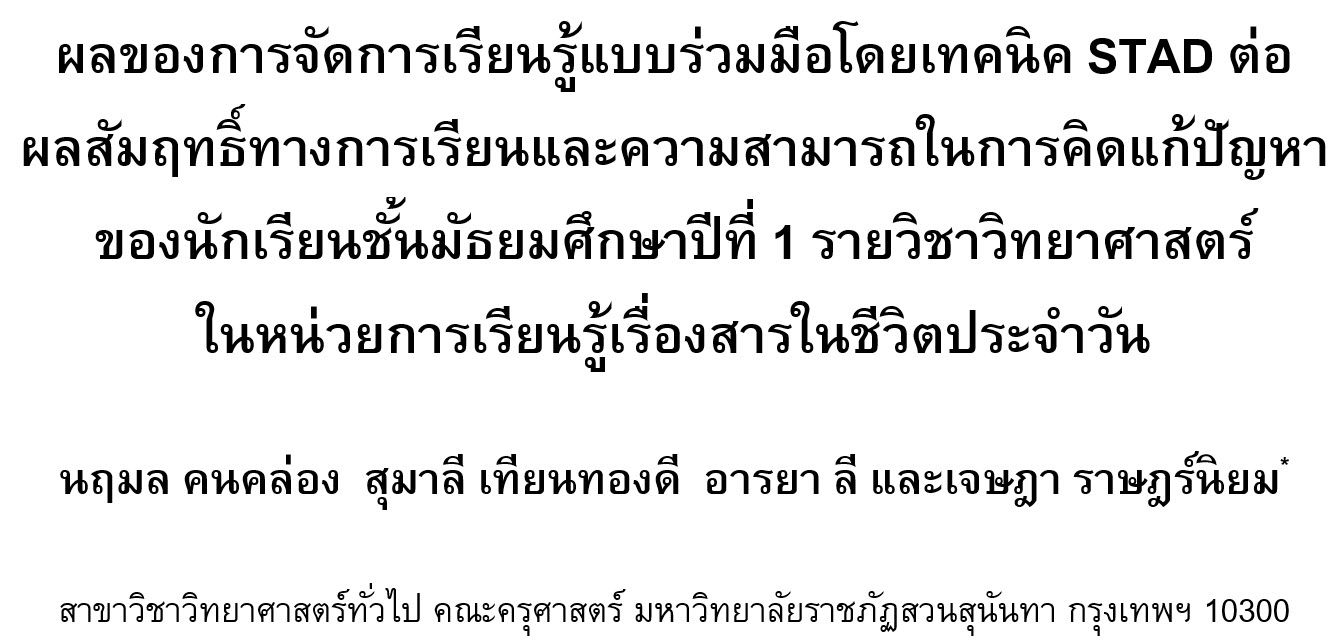ผลของการจัดการเรียนรู้แบบร่วมมือโดยเทคนิค STAD ต่อผลสัมฤทธิ์ทางการเรียนและความสามารถในการคิดแก้ปัญหาของนักเรียนชั้นมัธยมศึกษาปีที่ 1 รายวิชาวิทยาศาสตร์ ในหน่วยการเรียนรู้เรื่องสารในชีวิตประจำวัน
Main Article Content
Abstract
Naruemon Konklong, Sumalee Tientongdee, Araya Lee and Jadsada Ratniyom
รับบทความ: 21 พฤษภาคม 2561; แก้ไขบทความ: 8 เมษายน 2562; ยอมรับตีพิมพ์: 13 เมษายน 2562
บทคัดย่อ
งานวิจัยนี้มีวัตถุประสงค์เพื่อเปรียบเทียบผลสัมฤทธิ์ทางการเรียนและความสามารถในการคิดแก้ปัญหาของนักเรียนชั้นมัธยมศึกษาปีที่ 1 โดยใช้การจัดการเรียนรู้แบบร่วมมือโดยใช้เทคนิค STAD กับการจัดการเรียนรู้แบบปกติ ในหน่วยการเรียนรู้เรื่อง สารในชีวิตประจำวัน กลุ่มตัวอย่างในงานวิจัยนี้คือนักเรียนชั้นมัธยมศึกษาปีที่ 1 โรงเรียนรัฐบาลแห่งหนึ่งในกรุงเทพมหานคร จำนวน 60 คน ได้มาจากวิธีการสุ่มแบบกลุ่ม กลุ่มตัวอย่าง 60 คนนี้ถูกแบ่งเป็น กลุ่มทดลอง (30 คน) และกลุ่มควบคุม (30 คน) กลุ่มทดลองจะได้รับการจัดการเรียนรู้แบบร่วมมือโดยใช้เทคนิค STAD ส่วนกลุ่มควบคุมจะได้รับการจัดการเรียนรู้แบบปกติ เครื่องมือที่ใช้ในการวิจัย ได้แก่ แผนการจัดการเรียนรู้แบบร่วมมือโดยใช้เทคนิค STAD แผนการจัดการเรียนรู้แบบปกติ แบบทดสอบวัดผลสัมฤทธิ์ทางการเรียน และแบบทดสอบวัดความสามารถในการแก้ปัญหาของผู้เรียน ข้อมูลที่ได้จะถูกวิเคราะห์ด้วยค่าทางสถิติคือ ค่าเฉลี่ย ร้อยละ การทดสอบทีแบบกลุ่มตัวอย่างเป็นอิสระต่อกัน และค่าความก้าวหน้าทางการเรียน (normalized gain) ผลการวิจัยพบว่าผลสัมฤทธิ์ทางการเรียนของกลุ่มทดลองสูงกว่ากลุ่มควบคุม (p < .05) และความสามารถในการคิดแก้ปัญหาของนักเรียนที่ได้รับการจัดการเรียนรู้แบบร่วมมือโดยใช้เทคนิค STAD สูงกว่าการจัดการเรียนรู้แบบปกติ (p < .05)
คำสำคัญ: การเรียนรู้แบบร่วมมือโดยใช้เทคนิค STAD ผลสัมฤทธิ์ทางการเรียน ความสามารถในการคิดการแก้ปัญหา
Abstract
The purposes of this research were to compare students’ learning achievement and problem–solving abilities of grade 7 students by using STAD–cooperative learning method and conventional learning method in the unit of chemicals in daily life. The samples of this study were 60 students in grade 7 at a public school in Bangkok. A total number of 60 students were randomly selected by using cluster random sampling method. They were divided into an experimental group (n = 30) and a control group (n = 30). The experimental group was taught by STAD–cooperative learning method whereas the control group was taught by conventional learning method. The research instruments used to collect data were STAD–cooperative learning lesson plans, conventional learning lesson plans, a learning achievement test, and a problem–solving ability test. Data were statistically analyzed by using means, percentage, t–test for independent sample, and normalized gain. The results revealed that students’ learning achievement of experimental group was significantly higher than the control group (p < .05). In addition, students’ problem–solving abilities of experimental group was significantly higher than the control group (p < .05).
Keywords: STAD–cooperative learning method, Learning achievement, Problem–solving abilities
Downloads
Article Details

This work is licensed under a Creative Commons Attribution-NonCommercial 4.0 International License.
References
Aonseemuang, W. (2011). A Study on Science Learning Achievement and Ability in Solving Scientific Problems through STAD (Student Team Achievement Division) and LT (Learning Together) of Mathayomsuksa 3Students. Master of Education Thesis in Secondary Education. Bangkok: Srinakharinwirot University. (in Thai)
Chaiyo, A. (2012). Effect of learning activity by cooperative learning with the student team achievement division technique on science achievement an satisfaction of matthayomsuksa 1 students. Journal of Education 23(3): 151–161. (in Thai)
Chancharern, W. (1999). Current Teaching System. Sakon Nakhon: Faculty of Education, Sakon Nakhon Rajabhat University. (in Thai)
Hake, R. R. (1998). Interactive–engagement versus traditional methods: A six–thousand–student survey of mechanics test data for introductory physics courses. American Journal of Physics 66(1): 64–74.
Jaiteang, A. (2007). Teaching Principle. Bangkok: Odeon Store. (in Thai)
Laopaisalpong, W. (2011). A Study of the Problem Solving Ability and the Interest in Thai of Mathayomsuksa III Students through the Problem Solving Method and the Teacher’s Manual. Master of Education Thesis in Secondary Education. Bangkok: Srinakharinwirot University. (in Thai)
Ministry of Education. (2012). Basic Education Core Curriculum B.E. 2551. Bangkok: Agriculture Cooperative of Thailand Printing. (in Thai)
Muangkeaw, P., Wuttisela, K., and Pungpo, P. (2010). Enhancing learning outcome with cooperative learning in electrochemistry. Journal of Research Unit on Science, Technology and Environment for Learning 1(1): 20–27. (in Thai)
Office of the National Economics and Social Development Board. (1997). The Eighth National Economics and Social Development Plan. Bangkok, Thailand. (in Thai)
Office of the National Education Commission. (2002). National Education Act B.E. 2542 (1999) and Amendments (Second National Education Act .B.E. 2545 (2002). Bangkok: Skybook. (in Thai)
Pantapalangkoor, B. (2008). A study on Science Learning Achievement and Emotional Intelligence of mathayomsuksa I students at Srinakharinwirot University Prasarnmit Demonstration School (Secondary) through STAD (Student Team–Achievement Divisions) and Inquiry Process. Master of Education Thesis in Secondary Education. Bangkok: Srinakharinwirot University. (in Thai)
Slavin, R. E. (1987). Ability grouping and student achievement in elementary schools: A best–evidence synthesis. Review of Educational Research 57(3): 293–336.
Suratanareungchai, V., Tubsri, C., Sookpree-dee, L., Yamkasikorn, M., Wisessuwan, A., Muongmee, S., Thongsorn, P., Jenjit, A., and Chayvimol, R. (2005). The current instructional practices and problems of providing instruction of instructors at Burapha University. Journal of Education 17(2): 105–118. (in Thai)
The National Institute of Educational Testing Service. (2016). Annual report 2016. Retrieved from http://www.niets.or.th/th/catalog/view/431, May 15, 2018. (in Thai)
Tongchai, A., Arayathanitkul, K., Soankwan, C., Emarat, N., and Chitaree, R. (2007). A new assessment method by using pre–test and post–test scores. HCU Journal, 11(21): 86–94. (in Thai)
Toomped, I., Prasantree, T., and Anantarak, M. (2014). A comparison of science learning achievements on ‘Substances in daily life’ and of scientific analytical thinking abilities of prathom suksa 6 students through cooperative learning management using the STAD technique versus the knowledge inquiry. Nakhon Phanom University Journal 4(1): 29–36. (in Thai)
Weir, J. J. (1974) Problem solving is everybody’s problem. The Science Teacher 41(4): 16–18.
